Net digestive absorption and adaptive hyperphagia in adult short bowel patients
- PMID: 15306586
- PMCID: PMC1774175
- DOI: 10.1136/gut.2003.030601
Net digestive absorption and adaptive hyperphagia in adult short bowel patients
Abstract
Background and aims: Intestinal adaptation after small bowel resection in humans is debated. We have quantified in adult short bowel (remnant small bowel length <2 m) patients oral intake and net digestive absorption and their evolution over time.
Patients and methods: Oral intake and faecal output were studied over three days in 90 patients (39 and 51 without or with parenteral nutrition, respectively) and in 14 patients in early (<6 months) and late (>6 months) periods after digestive continuity. Nitrogen and fat output were measured using chemiluminescence and Van de Kamer techniques, respectively.
Results: In the whole group, 81% of patients had hyperphagia (spontaneous oral intake >1.5 x resting energy expenditure), independently and negatively related to fat absorption (p<0.01) and body mass index (p<0.001) but not braked by the presence of parenteral nutrition. Protein and fat absorption were related to small bowel length. We observed, in the late in comparison with the early period after digestive continuity: an increase in oral intake (1.6 v 2.3 resting energy expenditure), decrease in stool weight/oral intake ratio, no reduction in per cent fat absorption, and protein absorption improvement associated with a significant increase in the amount of protein absorbed (40 v 64 g/day; p<0.05), both being correlated with remnant small bowel length (p<0.01).
Conclusions: This study confirms an adaptive hyperphagia in adult short bowel patients. Over time, hyperphagia and amount of protein absorbed increased, the latter being related to remnant small bowel length, indicating a behavioural adaptation that allows expression of intestinal absorptive adaptation.
Figures
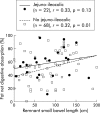
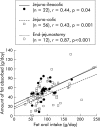
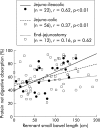
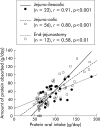

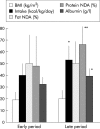


References
-
- Messing B , Crenn P, Beau P, et al. Long-term survival and parenteral nutrition-dependency of adult patients with short bowel syndrome. Gastroenterology 1999;117:1043–50. - PubMed
-
- Cosnes J , Carbonnel F, Beaugerie L, et al. Functional adaptation after extensive small bowel resection in humans. Eur J Gastroenterol Hepatol 1994;6:197–202.
-
- Powel-Tuck J . Don’t expect too much of intestinal adaptation in short bowel syndrome. Eur J Gastroenterol Hepatol 1994;6:193–5.
-
- Dowling RH, Booth CC. Functional compensation after small-bowel resection in man. Demonstration by direct measurement. Lancet 1966;ii:146–7. - PubMed
-
- Gouttebel MC, Saint Aubert B, Astre C, et al. Intestinal adaptation in patients with short bowel syndrome. Measurement by calcium absorption. Dig Dis Sci 1989;34:709–15. - PubMed
MeSH terms
Substances
LinkOut - more resources
Full Text Sources
